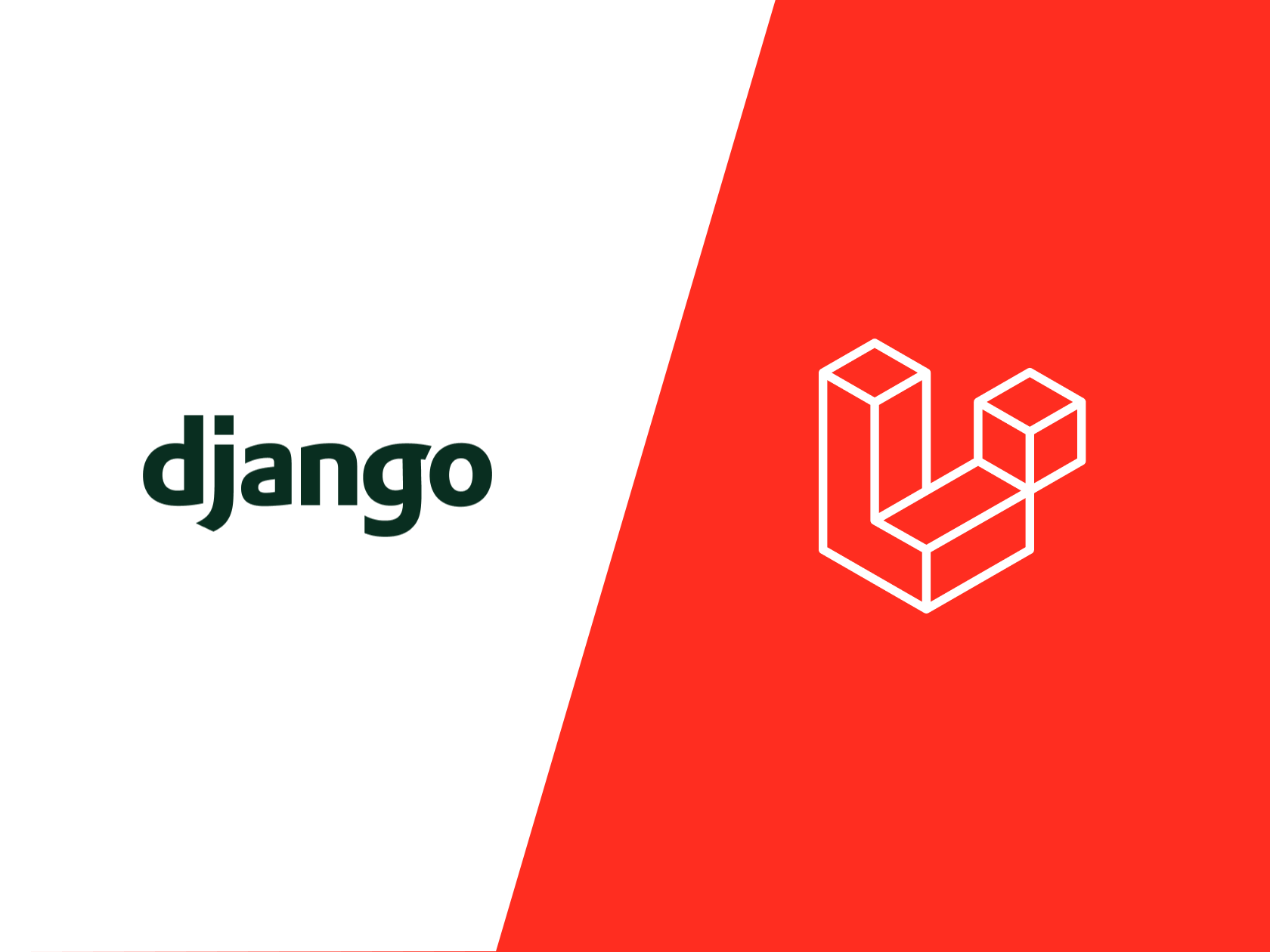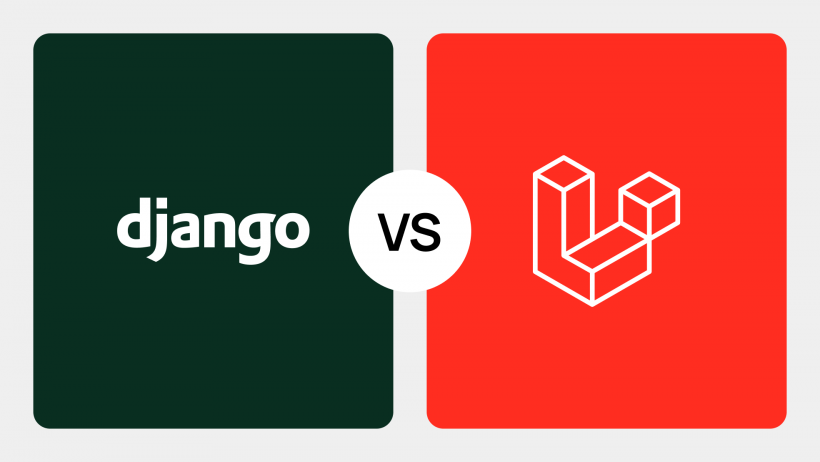If you have an idea to transfer some services or products into the digital plane and now are considering the best tools for backend development, you may have already checked the features of Laravel and Django frameworks. Indeed, these two are common choices for creating the server side of custom web applications: they are convenient, have a low entry threshold, and, in general, are able to cover many tasks associated with backend development directly out-of-the-box. Below, we will discuss in more detail the key features of these two software platforms.
Key takeaways
- Laravel and Django are both open-source frameworks aimed at fast development of web applications and websites;
- Choose PHP-based Laravel to build high-speed, large-scale apps, custom web solutions, feature-rich and multilingual CMSes and blog websites, static and dynamic web pages, social networking platforms and SaaS apps, eCommerce websites and enterprise-level apps, forums, news, job portals, and so on;
- Choose Python-based Django to develop complex apps for data science, computation, artificial intelligence (AI) and machine learning (ML), and other scientific purposes.
What Are Web Frameworks?
A web framework is a framework created for developing dynamic websites, web applications, services, or resources. It simplifies development and eliminates the need to write routine code. Many frameworks also provide database access, interface and API development, and generally reduce code duplication.
What Is Django?
Django is a high-level Python web framework that allows developers to quickly build secure and highly scalable websites and web applications based on an MVT (model-view-template) architecture pattern. First implemented in 2005, Django has amassed an active and strong community around the world as it allows developers to focus on writing only non-trivial code components. This framework also has excellent documentation and many options for both free and paid support.

However, is Django good for web development? Overall, it is a perfect choice to do almost anything that can be implemented out of the box, from content management systems and wikis to social networks and news sites. It can deal with any environment and can deliver content in any format (HTML, JSON, XML, etc.). Also, a project created in Django, if necessary, can be expanded with third-party components (however, this is rarely needed due to its extensive set of default functions, like emailing systems, algorithm-based generators, admin dashboards, verification systems, etc.).
Finally, Django is safe as it provides a secure way to manage user accounts and passwords, as well as ensures protection against many vulnerabilities, including SQL injection, cross-site scripting, clickjacking, and so on.
What tools can be integrated with the Django framework?
One of the key advantages of the Django framework is its support for microservice architecture, CDNs, and multilingual projects. All these features make scaling Django projects easier than with any other popular backend framework.
What Is Laravel?
Laravel is a free, open-source PHP framework distributed under the MIT license that was created for building complex websites and web applications. First launched in 2011, it continues to simplify tasks for developers to implement authentication, routing, sessions, caching, architecture, and working with databases. Laravel was among the first to work with PSR-4, a standard that allows structuring a web resource taking into account individual client requirements.
The main trigger for choosing this alternative to Django is adherence to the MVC (model-view-controller) architecture pattern. Specifically, all project components, according to the Laravel architecture, are divided into three parts: data and methods of working with them, viewing this data to the end user, and routing this data from the user to the system and vice versa.

Other advantages of Laravel over other frameworks include the simple and concise syntax of the framework, which allows developers to focus all their attention on implementing business logic instead of dealing with transferring dependencies (there is Composer for this), writing queries in SQL (instead, developers can use the built-in query builder and Eloquent ORM), separation of their logic (there are built-in Restful controllers for this), support for class routes (there is a class autoloading function), version control for database schemas (there are migration functions instead), and other fundamental things.
What tools can be integrated with the Laravel framework?
Laravel is considered an extremely flexible framework that is perfectly adapted for third-party integrations. It also uses Artisan and easy-to-make custom code generators. All these features allow developers to significantly expand the already rich functionality of the framework, making it an excellent choice for constantly growing projects.
Django vs Laravel: An In-Depth Comparison
Now, we propose you switch from describing the general features of both frameworks to comparing them according to a list of essential parameters important for developers and product owners.
…Or Should You Still Choose WordPress?
As you may know, WordPress is a popular low-code tool for creating websites and applications. It has an extremely steep learning curve and can only require your team to program a few functions while the rest of the project can be implemented through the GUI. This certainly reduces development time.
However, for many projects, the capabilities of WordPress turn out to be very limited – this explains why developers have to choose a full-fledged framework for the project’s technology stack.
Best Use Cases for Django and Laravel
Now, let's consider specific cases of using these frameworks in our practice.
|
Feature |
Django |
Laravel |
|
Architecture pattern |
MVT |
MVC |
|
Build-in security measures |
User authentication and protection against most common types of cyberattacks |
Bcrypt hashing and SQL injection protection |
|
Object Relational Mapper (ORM) |
A proprietary ORM for easy database management |
Eloquent, a PHP Active Record implementation |
|
Useful tools available by default |
Emailing systems, algorithm-based generators, admin dashboards, management interfaces, verification systems |
Laravel Debugbar, IDE Helper, Laravel Tinker, Laravel Socialite |
|
Compatibility |
Microservices, CDNs, multilingual support |
Artisan and easy-to-make custom code generators |
How we develop with Laravel
At the beginning of 2023, we were approached by a client for an MVP development of a mobile application for people who need a centralized solution to store and monitor the dynamics of their medical analyses.
After discussing project requirements, we were assigned the following goals:
- create a user-friendly mobile app for storing and monitoring test results, scheduling visits to doctors, as well as saving recommendations and prescriptions;
- launch the project’s MVP in the shortest possible time;
- plan the further evolution of the project.
To achieve these goals, we chose Laravel and Flutter. This allowed us to move straight towards technical design, excluding the prototyping stage. After that, we came up with a product backlog, estimated the project, and began development according to the Fixed Price pricing model.
The MVP was implemented in five months and uploaded to app stores. Currently, we are expanding the functionality of this product to turn it into a full-fledged mobile app. You can get more information about this case here.
Case with Django
The next case is dedicated to Delivery Group, a US leader in the transportation and logistics sector with 20+ years of experience. The client needed a custom cross-platform mobile app with an eye-catching design and multiple advanced features.
Specifically, we had to:
- redesign the exisiting solution (it has to be divided into three logical parts: primary, commercial, and informational sections);
- introduce new automation features, like cargo inspection and readdressing, imposing/removing bans on delivery, creation of templates and draft receipts, real-time demonstration of the cargo status, warehouse geo-based searching, the loyalty program, a CN calculator, and so on;
- create a user-friendly application with an intuitive UI inspired by the brand's image of Delivery Auto.
To bring all these features and requirements to life, we chose Django. As a result, the client received a cross-platform tool guiding the customers through the whole delivery cycle, from invoice generation until delivery to the final destination. After the product’s launch, the organic downloads skyrocketed by 300%. The app was featured in the App Store’s top 30 and Google Play's top 20 in the Business categories. Moreover, during the first nine months after the app's release, the client’s company increased its customer base by two times compared to the same period last year. If you would like to get more information about this case, please, follow this link.
Which Framework Is Better for Web Development?
Debates regarding the comparison of the Django vs Laravel couple are ongoing among developers to this day, so it is impossible to say unequivocally which one is better. At the same time, there are a number of distinctive characteristics for each of them, which can be fundamental for each specific project. Thus, knowing them can make solving your dilemma much easier.

For instance, when it comes to speed, Django has no competition, thanks to the super-fast Python it supports. Therefore, it’s better to use it when dealing with resource-intensive solutions with sophisticated business logic (especially, when it comes to implementation of ML- and AI- algorithms).
Along with that, both Laravel and Django are aimed at creating scalable solutions – this is facilitated by support for cloud computing, microservices, advanced caching capabilities, etc.
Thus, we can conclude that Django will be an ideal solution for creating social networks, AI- and ML-based applications, data science applications, e-commerce CRMs, system administration solutions, as well as large-scale B2B applications that require increased security.
As for Laravel, this framework is perfect for developing one-page websites, applications with a limited budget, as well as SEO-optimized projects. However, you can still use Laravel for eCommerce solutions if they imply scaling – in the end, all will depend on specifics of a programming language the framework of your choice supports.
In general, all these recommendations on Laravel and Laravel alternatives include exceptions, and ultimately, the choice in favor of a specific framework is best left to an experienced development team. In particular, you can contact us to choose the optimal tech stack for your project and bring your business idea to life.
Conclusion
We hope that now you have a better understanding of why your team might choose a particular framework for backend development. If your project involves creating a mobile application, we recommend that you check out our article about native vs hybrid app development – perhaps the insights you will receive after reading it will help you make an informed decision in favor of the most cost-effective approach to development.

